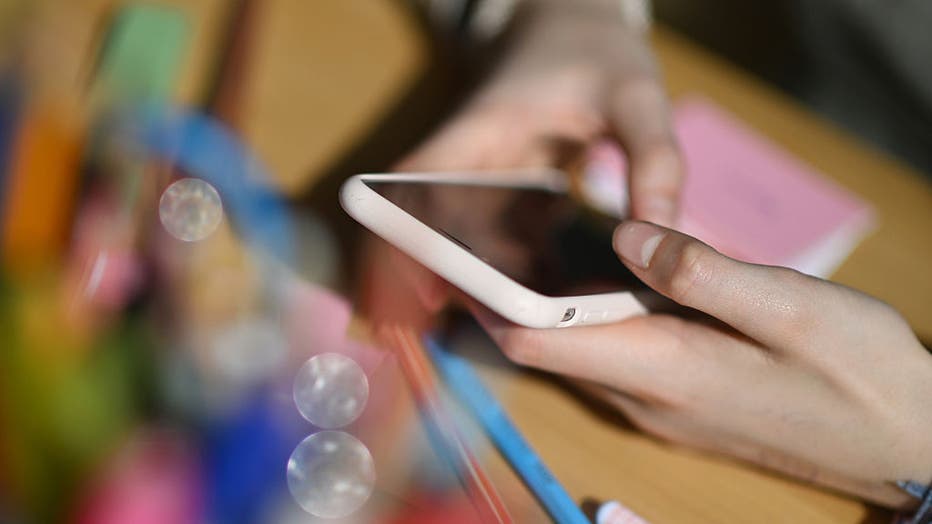Map: Which states have banned cell phones in schools
More and more states are moving towards banning cellphones in schools.
Florida was the first state to pass a law regulating the use of cellphones in schools in 2023.
Just two years later, more than half of all states have laws in place, with more likely to act soon.
Why you should care:
Bills have sprinted through legislatures this year in states as varied as New York and Oklahoma, reflecting a broad consensus that phones are bad for kids.
RELATED: Pres. Trump signs 'Take It Down Act' bill designed to fight AI deepfakes, revenge porn
So far, 26 states have passed laws, with eight other states and the District of Columbia implementing rules or making recommendations to local districts. Of the states, 17 have acted this year.
Nebraska Republican Gov. Jim Pillen signed a law banning phones throughout the school day.
Alaska lawmakers required schools to regulate cellphones when they overrode an education package Republican Gov. Mike Dunleavy had vetoed for unrelated reasons.
What's next:
More action is coming as bills await a governor's signature or veto in Florida, Missouri, Nebraska and New Hampshire.
RELATED: Teacher quits profession after viral rant on how AI is 'ruining' education
What they're saying:
Connecticut state Rep. Jennifer Leeper, a Democrat and co-chair of the General Assembly’s Education Committee, on May 13 called phones "a cancer on our kids" that are "driving isolation, loneliness, decreasing attention and having major impacts both on social-emotional well-being but also learning."

A schoolchild sits at a desk with school materials and holds a smartphone in his hands. (Staged scene). Photo: Marijan Murat/dpa (Photo by Marijan Murat/picture alliance via Getty Images)
"This is a not just an academic bill," Republican Rep. Scott Hilton said after Georgia's bill, which only bans phones in grades K-8, passed in March. "This is a mental health bill. It’s a public safety bill."
How does the cellphone ban policy work?
Dig deeper:
When Florida first acted, lawmakers ordered schools to ban phones during instructional time while allowing them between classes or at lunch.
But now there's another bill awaiting Gov. Ron DeSantis' action that goes further. It would ban phones for the entire school day for elementary and middle schools.
Ten states and the District of Columbia have enacted school day bans, most for students in grades K-12, and they now outnumber the seven states with instructional time bans.

Newsom wants smartphone ban in California schools
FROM THE ARCHIVES: Titania Jordan, Chief Parent Officer at Bark Technologies, joins LiveNOW's Austin Westfall to tackle the discussion of schools banning cell phones.
Where policymakers have moved ahead, there's a growing consensus around exceptions. Most states are letting students use electronic devices to monitor medical needs and meet the terms of their special education plans. Some are allowing exceptions for translation devices if English isn't a student's first language or when a teacher wants students to use devices for classwork.
There are some unusual exceptions, too. South Carolina's original policy allowed an exception for students who are volunteer firefighters. West Virginia's new law allows smartwatches as long as they are not being used for communication.
Some parents oppose cellphone ban
The other side:
The most high-profile exception has been allowing cellphone use in case of emergencies. One of the most common parent objections to a ban is that they would not be able to contact their child in a crisis like a school shooting.
"It was only through text messages that parents knew what was happening," said Tinya Brown, whose daughter is a freshman at Apalachee High School, northeast of Atlanta, where a shooting killed two students and two teachers in September. She spoke against Georgia's law at a news conference in March.

Social media ban in Australia for those under 16
A social media ban for children under 16 passed the Australian Parliament on Friday in a world-first law.
Some laws call for schools to find other ways for parents to communicate with their children at schools, but most lawmakers say they support giving students access to their cellphones, at least after the immediate danger has passed, during an emergency.
In some states, students have testified in favor of regulations, but it's also clear that many students, especially in high schools, are chafing under the rules. Kaytlin Villescas, a sophomore at Prairieville High School, in the suburbs of Baton Rouge, Louisiana, is one student who took up the fight against bans, starting a petition and telling WBRZ-TV in August that Louisiana's law requiring a school day ban is misguided. She argued that schools should instead teach responsible use.
There have been a few states where lawmakers failed to act at all. Maybe the most dramatic was in Wyoming, where senators voted down a bill in January, with some opponents saying teachers or parents should set the rules.
Why are states banning cellphones in schools?
Big picture view:
The push for cellphone bans has been driven by concerns about the impact screen time has on children’s mental health and complaints from teachers that cellphones have become a constant distraction in the classroom.
Former Surgeon General Dr. Vivek Murthy, who has called on Congress to require warning labels on social media platforms about their effects on young people’s lives, has said schools need to provide phone-free times.
The Source: The Associated Press contributed to this report. The information in this story comes from a review of recent state legislation, statements from lawmakers, and interviews with parents and students. This story was reported from Los Angeles.


